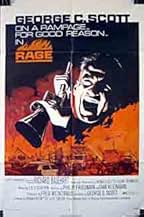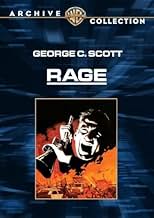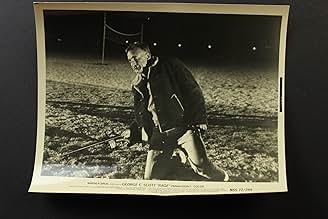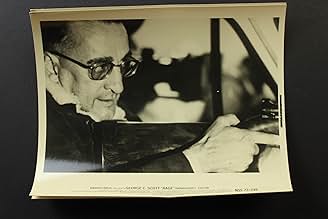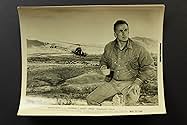IMDb RATING
6.3/10
1.5K
YOUR RATING
An accidental nerve gas leak by the military kills not only a rancher's livestock, but also his son. When he tries to hold the military accountable for their actions, he runs up against a wa... Read allAn accidental nerve gas leak by the military kills not only a rancher's livestock, but also his son. When he tries to hold the military accountable for their actions, he runs up against a wall of silence.An accidental nerve gas leak by the military kills not only a rancher's livestock, but also his son. When he tries to hold the military accountable for their actions, he runs up against a wall of silence.
- Director
- Writers
- Stars
- Director
- Writers
- All cast & crew
- Production, box office & more at IMDbPro
Featured reviews
Almost everything in this film is predictable. The failure of the military to take responsibility, the complicity of local physicians and authorities, and a complete cover-up by the military brass; all of it rather predictable.
Despite these types of nerve gas weapons being outlawed by the Geneva Convention, they still, of course, still exist, within various nefarious military installations dedicated to this type of warfare. The military does not particularly care what the Geneva Convention has to say about these weapons; all is fair under the guise of National Defense.
What transpired in the film, of course, was a tragedy, but the result was inevitable. Scott does a good job acting, and an adequate job of directing. However, the screenplay is so absolutely depressing from beginning to end, that even a raging George C Scott cannot save it. It is this predictability that ruins any chance of the film having elements like suspense or tension. Interesting to watch for Scott's performance.
Despite these types of nerve gas weapons being outlawed by the Geneva Convention, they still, of course, still exist, within various nefarious military installations dedicated to this type of warfare. The military does not particularly care what the Geneva Convention has to say about these weapons; all is fair under the guise of National Defense.
What transpired in the film, of course, was a tragedy, but the result was inevitable. Scott does a good job acting, and an adequate job of directing. However, the screenplay is so absolutely depressing from beginning to end, that even a raging George C Scott cannot save it. It is this predictability that ruins any chance of the film having elements like suspense or tension. Interesting to watch for Scott's performance.
George C. Scott has only one competitor as a player who can do a better Rage than him and that is Kirk Douglas. It's kind of fitting that one of them have on his list of credits a film entitled Rage.
I remember seeing this in the theater back in 1972 and it was one of those first films that showed the American government as something less than wise and benevolent. All the more so because Scott is one of those middle American characters who is a true believer in the Stars&Stripes and all it stand for.
Scott is a widower who owns a small sheep ranch and he and his son Nicholas Beauvy who is better known as one of the young men mentored by John Wayne in The Cowboys. As they decide to camp out with the sheep an army helicopter is flying in their vicinity. The next day Beauvy is very sick and Scott takes his son to a nearby hospital.
Where all kind of people from the military as represented by Dr. Martin Sheen and the Public Health Service as represented by Barnard Hughes are very interested in his case. Scott is admitted too and the smell of cover-up proves too much for Scott's personal physician Richard Basehart.
I can't go beyond this other than Scott's given an unbelievable amount of justification for declaring a personal war on the army and the government it fights for.
Scott hits several levels with his performance. His Rage and anger to be sure, but it's all mixed in with both sorrow and betrayal. Director Scott did well by actor Scott.
In many ways Rage is a film for today's audience and I recommend it highly.
I remember seeing this in the theater back in 1972 and it was one of those first films that showed the American government as something less than wise and benevolent. All the more so because Scott is one of those middle American characters who is a true believer in the Stars&Stripes and all it stand for.
Scott is a widower who owns a small sheep ranch and he and his son Nicholas Beauvy who is better known as one of the young men mentored by John Wayne in The Cowboys. As they decide to camp out with the sheep an army helicopter is flying in their vicinity. The next day Beauvy is very sick and Scott takes his son to a nearby hospital.
Where all kind of people from the military as represented by Dr. Martin Sheen and the Public Health Service as represented by Barnard Hughes are very interested in his case. Scott is admitted too and the smell of cover-up proves too much for Scott's personal physician Richard Basehart.
I can't go beyond this other than Scott's given an unbelievable amount of justification for declaring a personal war on the army and the government it fights for.
Scott hits several levels with his performance. His Rage and anger to be sure, but it's all mixed in with both sorrow and betrayal. Director Scott did well by actor Scott.
In many ways Rage is a film for today's audience and I recommend it highly.
I've been looking forward tremendously to "Rage" and pretty much knew for certain that I would like it, even though the film is rather obscure, unsung and quite difficult to come across. It certainly isn't a hidden gem or undiscovered classic, but I have a personal weakness for "rural" and politically themed drama/thrillers from the early seventies period; especially when a few interesting names are involved. In this case, it's one of the rare movies that George C. Scott directed himself, next to also starring in the lead role. Scott stars as Dan Logan, a widower and sheep herder living on an enormous ranch in the secluded countryside of Wyoming together with his teenage son Chris. During a crystal clear summer night, father and son decide to camp on their estate, but the next morning Dan finds his son in a critical unconscious condition. At the local hospital, Major Holliford already knows that they were both accidentally contaminated by a new type of military chemical/nerve gas due to a leak in the tank of a plane. The whole situation is covered up and handled with deep secrecy; so much even that Dan Logan isn't informed about his own son's death. Although suffering from the symptoms himself, Dan escapes from the hospital and sets out on a violent journey to unravel the ugly truth. The subject matter of "Rage" is truly compelling and also quite unsettling, since the events don't seem too far-fetched or unimaginable at all, but it doesn't result in the most spectacular action movie. The entire first hour is mainly talkative and slow, with protagonist George C. Scott lying sedated in a hospital bed and military doctor Martin Sheen professionally misleading Logan's regular physician and the rest of the medical staff. The final half hour is more lively and exciting, but it nevertheless remains somewhat unsatisfying. Dan Logan goes out on a furious John Rambo type of quest for vengeance, complete with stealing dirt bikes and setting off explosives, but eventually never achieves his mission. He kills a bunch of people, but they are all innocent marionettes (like policemen, security guards and even a playful ginger kitten!) while the real military harm-doers remain untouchable. As the director, Scott most certainly demonstrates that he's able to insert stylish little details and visionary touches, particularly through unexpectedly odd camera angles and enchanting slow-motion shots. "Rage" certainly isn't fundamental viewing, but still comes warmly recommended in case you enjoy conspiracy thrillers and/or the works of George C. Scott.
As you might be able to tell from the plot synopsis, Rage is a pretty upsetting movie to watch. Since you probably know my taste in films (if you've been reading the Rag for a while), you might wonder why I watched it in the first place. Made in 1972, it has remarkable relevancy in today's world, so I thought it might have an emotional impact. It certainly did! In fact, given a re-release, I'm sure it would be very popular at the box office.
In case you haven't read the synopsis, George C. Scott stars as a father who's teaching his young son the ropes about farming. They spend one night outdoors on their property, and in the morning, George finds his son bleeding and deathly ill. He rushes him to the hospital, but Dr. Martin Sheen soothes that there's nothing seriously wrong with the boy. Then why does Martin want to keep them both quarantined and take further tests? It turns out, there was a government experiment that went wrong, and a terrible chemical spill infected the air. With massive cover-ups in play, will George ever find out the truth?
This was a bit of a pet project for George, as he also directed the film. Perhaps he felt drawn to the 1970s "question authority" mantra, or perhaps he just liked the opportunity to fly off in a rage and get revenge on "the man". It is absolutely George's show, as he has to go through all the stages of worry, belief, grief, distrust, and vengeance. Although, I particularly liked Richard Basehart's performance in this film. He plays George's regular family doctor, and he comes across as extremely trustworthy. So, when he sits George down and lies to him about what's happening to his son, it's very eerie. If Mr. Honesty can be drawn into the cover-up, no one is safe!
Kiddy Warning: Obviously, you have control over your own children. However, due to gruesome images and upsetting scenes involving a child, I wouldn't let my kids watch it.
In case you haven't read the synopsis, George C. Scott stars as a father who's teaching his young son the ropes about farming. They spend one night outdoors on their property, and in the morning, George finds his son bleeding and deathly ill. He rushes him to the hospital, but Dr. Martin Sheen soothes that there's nothing seriously wrong with the boy. Then why does Martin want to keep them both quarantined and take further tests? It turns out, there was a government experiment that went wrong, and a terrible chemical spill infected the air. With massive cover-ups in play, will George ever find out the truth?
This was a bit of a pet project for George, as he also directed the film. Perhaps he felt drawn to the 1970s "question authority" mantra, or perhaps he just liked the opportunity to fly off in a rage and get revenge on "the man". It is absolutely George's show, as he has to go through all the stages of worry, belief, grief, distrust, and vengeance. Although, I particularly liked Richard Basehart's performance in this film. He plays George's regular family doctor, and he comes across as extremely trustworthy. So, when he sits George down and lies to him about what's happening to his son, it's very eerie. If Mr. Honesty can be drawn into the cover-up, no one is safe!
Kiddy Warning: Obviously, you have control over your own children. However, due to gruesome images and upsetting scenes involving a child, I wouldn't let my kids watch it.
Wyoming sheep rancher Dan Logan (George C. Scott) and his son Chris are tending to their flock. An Army helicopter flies by. Next morning after sleeping outside, Chris is in dire medical distress and there are dead sheep. Dan brings him to the hospital. He struggles to find any answers. Dr. Holliford (Martin Sheen) asks all knowing questions and immediately puts Chris in isolation. He gives their family doctor Dr. Caldwell (Richard Basehart) a secret handshake. The Army had accidentally released some nerve gas. Dr. Spencer (Barnard Hughes) from Public Health Service helps with the cover-up.
The Army aspect should be held back to give this story more mystery. I'd rather not have the Army folks do an extended exposition. The audience should discover the truth along with Dan. The reveal should be a shock. Spencer should be the one giving the full exposition. As for his vengeance, it would be nice if all his victims actually deserve it. Dan has a bit of Rambo in him but an unhinged Rambo can be very disconcerting.
The Army aspect should be held back to give this story more mystery. I'd rather not have the Army folks do an extended exposition. The audience should discover the truth along with Dan. The reveal should be a shock. Spencer should be the one giving the full exposition. As for his vengeance, it would be nice if all his victims actually deserve it. Dan has a bit of Rambo in him but an unhinged Rambo can be very disconcerting.
Did you know
- TriviaThe story was inspired by and incident at the Dugway Proving Grounds in Utah on 13 March 1968. The U.S. Army conducted tests of a nerve agent chemical weapon, later revealed to be VX nerve gas, including spraying it from a jet aircraft. Between 3,000 and 6,000 sheep were reportedly killed. The Army did not admit fault for the incident until 1998.
- GoofsAlthough most of the officers are wearing the Vietnam Campaign and Vietnam Service ribbons, none of them wears a patch on their right shoulder depicting the unit they served with in Vietnam. The wearing of such "combat patches" is customary in the U.S. Army.
- How long is Rage?Powered by Alexa
Details
- Release date
- Country of origin
- Language
- Also known as
- Sed de Venganza
- Filming locations
- Benson, Arizona, USA(Hospital scenes, Marie's truck stop sign)
- Production companies
- See more company credits at IMDbPro
Contribute to this page
Suggest an edit or add missing content



